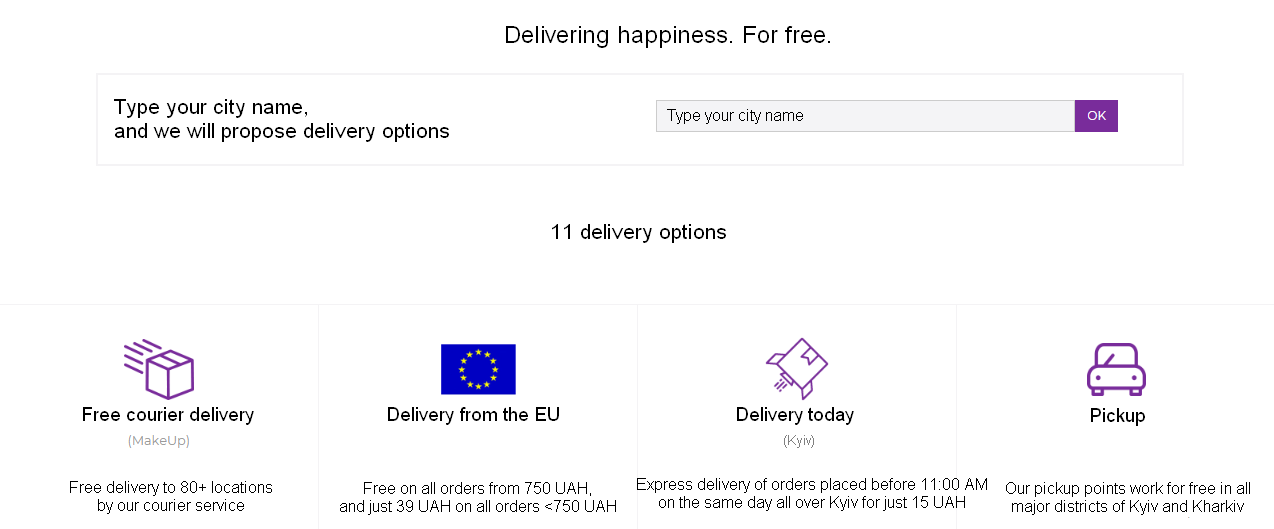Start Exploring Keyword Ideas
Use Serpstat to find the best keywords for your website
What information should be on the online store website
Information about the company and its product
Information requirements on the company and its products may vary depending on the state where a business entity is registered, however, there are some data that is required by any state to be present on the resource.
Necessary information about the company
- your full name and the entity type (individual entrepreneurship/legal entity) performing the entrepreneurial activity;
- the legal address of the company and the route map are also desirable;
- your landline phone number with the city code aside from mobile phones for contacting the vendor representatives;
- working hours of the online store;
- if your industry requires a license or the state attestation, you should specify the document number, the effective term, its issuance date, and the type of authority that issued the document.
Payment and delivery methods
- an opportunity to pick up an order from the company office or warehouse and its address;
- courier delivery of the store — delivery terms and the price of this service. Free delivery is a great advantage (for example, from a certain order amount);
- third-party mailing and courier companies delivering goods and their terms of providing delivery services;
- all available payment methods — cash on delivery, bank transfer to the company's bank account or by a bank card.
An example of providing brief information about the tariffs and terms for eleven delivery methods available in an online store:

Information about the products
- manufacturer and a country where the product was made;
- full name and the product range;
- product delivery methods, terms, and the price;
- information about the certificates, government standards or other documents certifying the safety and quality of the product;
- stock availability and the effective product price in the state currency;
- warranty period if it is established by the manufacturer;
- for food products — ingredients, nutritional values, the presence of GMO, production date, weight or volume, adverse health conditions;
- the product operational life;
- product defects.
Warranties and product return
Describe the conditions of the return of goods of proper and inadequate quality, non-returnable product categories as well as options for warranty service.
Credit terms

Special offers
In this example, the site has a countdown timer for each special offer, which shows how much time remains until its end:

Documents regulating the relationship of the vendor and the buyer
Public offer contract
Specify in the public offer contract which action of the buyer will be considered as the acceptance — placing an order or a payment for it. Also put down the conditions of placing an order and acceptance of the order by the seller, the procedure for returning and exchanging the goods in the public offer. The established conditions must not contradict the current legislation.
Processing and storage of personal data
Conclusion
- information about the online store, its legal status, and the address;
- licenses, certificates, accreditation documents if required by the online store sector;
- comprehensive and genuine information about the products;
- the terms of returning products and warranty service;
- information on the delivery and payment methods;
- special offers and their effective dates;
- purchasing on credit and its terms;
- the public offer contract and terms of use;
- personal data protection policy.
This article is a part of Serpstat's Checklist tool
 " title = "What information should be on the online store website 16261788341170" />
" title = "What information should be on the online store website 16261788341170" /> | Try Checklist now |
Speed up your search marketing growth with Serpstat!
Keyword and backlink opportunities, competitors' online strategy, daily rankings and SEO-related issues.
A pack of tools for reducing your time on SEO tasks.
Discover More SEO Tools
Tools for Keywords
Keywords Research Tools – uncover untapped potential in your niche
Serpstat Features
SERP SEO Tool – the ultimate solution for website optimization
Keyword Difficulty Tool
Stay ahead of the competition and dominate your niche with our keywords difficulty tool
Check Page for SEO
On-page SEO checker – identify technical issues, optimize and drive more traffic to your website
Recommended posts
Cases, life hacks, researches, and useful articles
Don’t you have time to follow the news? No worries! Our editor will choose articles that will definitely help you with your work. Join our cozy community :)
By clicking the button, you agree to our privacy policy.
